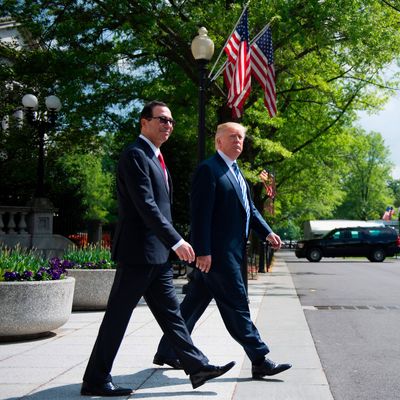
Yesterday, Treasury Secretary Steve Mnuchin said something of potentially very high significance that received no attention whatsoever. At a House subcommittee hearing, Mnuchin very casually walked away from Donald Trump’s long-standing promise never to touch Social Security benefits.
The exchange occurred more than an hour into the sleepy hearing. Utah Republican Chris Stewart made a plea for cutting mandatory spending, including Social Security. Mnuchin replied, “The president has made clear that on Social Security, that’s not something he’s addressing now, but if Congress wants to review that, obviously that’s within your prerogative.” Mnuchin was not pledging to cut Social Security. Instead, he was deferring the choice to Congress.
To understand the importance of this seemingly noncommittal statement, consider an exchange that took place earlier in the same hearing. Four months before, Mnuchin had pledged that the administration would not give rich people a tax cut. “Any reductions we have in upper-income taxes will be offset by less deductions so that there will be no absolute tax cut for the upper class,” he promised. But in the intervening months, Mnuchin and the administration have slowly wriggled away from that promise. At yesterday’s hearing, Democrat Matt Cartwright tried to hold Mnuchin to it. “If Congress passes a tax plan that does not adhere to the so-called Mnuchin rule,” he asked, “will President Trump veto it?” Mnuchin replied, “No, he will not.”
The administration’s promise not to cut taxes had thus been reduced to meaninglessness. It was a mere preference, or at least a putative preference. But Trump has deferred all agency to Congress, which is free to pass a bill opposite his stated position, and Trump would sign it. Congress is apparently a gigantic loophole in every Trump campaign stance. Trump has neither an affirmative role nor a negative role in shaping laws passed by Congress. Congress can write a law as it wishes, and Trump may sign it into law even if it violates his “principles.”
By that standard, Mnuchin’s concession on Social Security is significant indeed. He has acknowledged Congress has the “prerogative” to write and pass a bill cutting Social Security. His opposition is essentially technical.
This is not the only populist economic stance Trump has abandoned. In his speech announcing his candidacy, Trump said he would “save Medicare, Medicaid, and Social Security without cuts.” He has already endorsed plans to cut hundreds of billions of dollars from Medicaid. (The fact that Trump supports ending the Medicaid expansion in Obamacare means that his promise not to cut Medicaid from levels that existed before Obamacare is also moot, his budget director recently explained.) The administration has proposed deep cuts to SSDI, explaining that the disability-insurance portion of Social Security doesn’t count. His plan for a trillion dollars in federal infrastructure spending became a plan to cut federal spending on infrastructure while spreading around some tax breaks for builders. His promise for generous universal health insurance has gone by the wayside. In almost every respect, Trump has conformed to orthodox right-wing domestic policy.
Cutting Social Security is not likely to happen any time soon, of course. Stewart suggested it happen during the second two years of Trump’s term. (Perhaps after tax cuts and military-spending increases have created a debt crisis that Republicans could exploit.) Mulvaney’s comments clearly lay the groundwork for Trump to cooperate. If a moment of political opportunity arrives, the Trump administration will be ready to launch an attack on the welfare state far more aggressive and radical than anybody imagined.






























